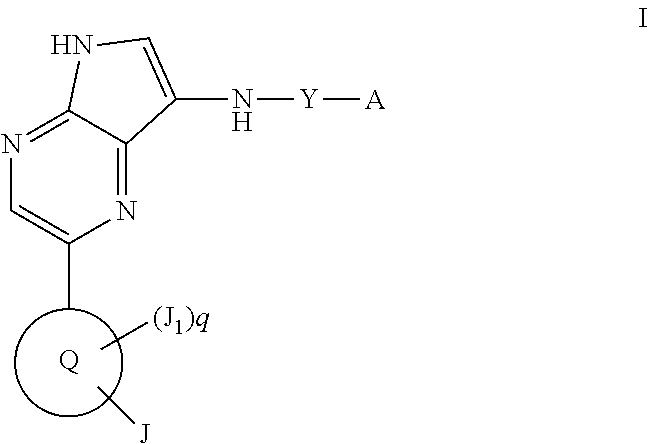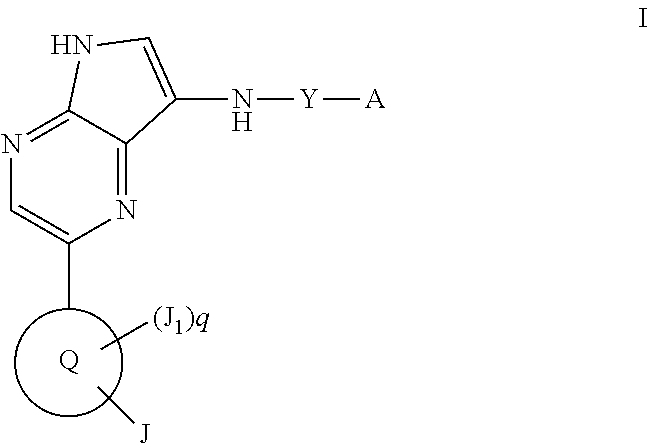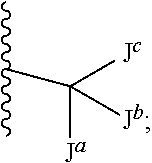Compounds useful as inhibitors of ATR kinase
a technology of atr kinase and compounds, applied in the direction of heterocyclic compound active ingredients, biocide, drug compositions, etc., can solve problems such as dna damage, and achieve the effect of surprising synergy
- Summary
- Abstract
- Description
- Claims
- Application Information
AI Technical Summary
Benefits of technology
Problems solved by technology
Method used
Image
Examples
example 1
N-(2-(4-(isopropylsulfonyl)phenyl)-5H-pyrrolo[2,3-b]pyrazin-7-yl)benzamide (Compound I-1)
[0248]
Method A
Step 1: 5-(4-(Isopropylsulfonyl)phenyl)pyrazin-2-amine
[0249]
[0250]5-Bromopyrazin-2-amine (5 g, 28.74 mmol), (4-isopropylsulfonylphenyl) boronic acid (7.866 g, 34.49 mmol) and K3PO4 (12.20 g, 57.48 mmol) were combined in MeCN (100 mL) / Water (25 mL) and Pd[P(Bu)3]2 (734.4 mg, 1.437 mmol) was added. The reaction was heated at 60° C. for 1 hour. The reaction mixture was cooled to ambient temperature and diluted with EtOAc and water. The layers were separated and the aqueous layer extracted with EtOAc (×3). The combined organic layers were dried (MgSO4), filtered and concentrated in vacuo. The residue was triturated from DCM and isolated by filtration to give the sub-title compound as an orange solid (6.43 g, 76% Yield). 1H NMR (400.0 MHz, DMSO) δ 1.17 (d, 6H), 3.43 (sept, 1H), 6.86 (s, 2H), 7.87 (d, 2H), 8.00 (s, 1H), 8.20 (d, 2H) and 8.67 (s, 1H) ppm; MS (ES+) 278.2.
Step 2: 3-Bromo-5-...
example 2
Cellular ATR Inhibition Assay
[0299]Compounds can be screened for their ability to inhibit intracellular ATR using an immunofluorescence microscopy assay to detect phosphorylation of the ATR substrate histone H2AX in hydroxyurea treated cells. HT29 cells are plated at 14,000 cells per well in 96-well black imaging plates (BD 353219) in McCoy's 5A media (Sigma M8403) supplemented with 10% foetal bovine serum (JRH Biosciences 12003), Penicillin / Streptomycin solution diluted 1:100 (Sigma P7539), and 2 mM L-glumtamine (Sigma G7513), and allowed to adhere overnight at 37° C. in 5% CO2. Compounds are then added to the cell media from a final concentration of 25 μM in 3-fold serial dilutions and the cells are incubated at 37° C. in 5% CO2. After 15 min, hydroxyurea (Sigma H8627) is added to a final concentration of 2 mM.
[0300]After 45 min of treatment with hydroxyurea, the cells are washed in PBS, fixed for 10 min in 4% formaldehyde diluted in PBS (Polysciences Inc 18814), washed in 0.2% Tw...
example 3
ATR Inhibition Assay
[0303]Compounds were screened for their ability to inhibit ATR kinase using a radioactive-phosphate incorporation assay. Assays were carried out in a mixture of 50 mM Tris / HCl (pH 7.5), 10 mM MgCl2 and 1 mM DTT. Final substrate concentrations were 10 μM [γ-33P]ATP (3mCi 33P ATP / mmol ATP, Perkin Elmer) and 800 μM target peptide (ASELPASQPQPFSAKKK).
[0304]Assays were carried out at 25° C. in the presence of 5 nM full-length ATR. An assay stock buffer solution was prepared containing all of the reagents listed above, with the exception of ATP and the test compound of interest. 13.5 μL of the stock solution was placed in a 96 well plate followed by addition of 2 μL of DMSO stock containing serial dilutions of the test compound (typically starting from a final concentration of 15 μM with 3-fold serial dilutions) in duplicate (final DMSO concentration 7%). The plate was pre-incubated for 10 minutes at 25° C. and the reaction initiated by addition of 15 μL [γ-33P]ATP (fi...
PUM
| Property | Measurement | Unit |
|---|---|---|
| temperature | aaaaa | aaaaa |
| temperature | aaaaa | aaaaa |
| temperature | aaaaa | aaaaa |
Abstract
Description
Claims
Application Information
 Login to View More
Login to View More - R&D
- Intellectual Property
- Life Sciences
- Materials
- Tech Scout
- Unparalleled Data Quality
- Higher Quality Content
- 60% Fewer Hallucinations
Browse by: Latest US Patents, China's latest patents, Technical Efficacy Thesaurus, Application Domain, Technology Topic, Popular Technical Reports.
© 2025 PatSnap. All rights reserved.Legal|Privacy policy|Modern Slavery Act Transparency Statement|Sitemap|About US| Contact US: help@patsnap.com



